After doing his Master thesis in software engineering at SICK, Jonathan joined the robot guidance team as a development engineer. He tells about how he decided to apply for his thesis at SICK and what his experience was like.
Can you introduce yourself?
I am originally from Lund and moved to Linköping to study computer science and software engineering. I have always been interested in programming – originally from gaming. I always wanted to understand how things worked behind the scenes. When deciding on a program to apply to, I chose software engineering over engineering as it focused more on practical programming than purely theoretical subjects.
Currently, I am working as a software development engineer in the robot-guidance team. It is a wide role, with a focus on our main software.
What interested you in applying for a thesis with SICK?
I had worked at SICK Linköping for a summer job the year before, so I knew that people were nice. It was a role in the 3D camera team, where I focused on further developing their testing software, something I had previous experience with. After that, I continued to work a few hours extra parallel to my studies. So, when I started looking for a thesis opportunity, I naturally looked for the open opportunities at SICK.
I also came to the thesis night that SICK had organized. It was an occasion to meet people from several departments and ask them what they were working with. It gave me a better picture of why the thesis projects were needed, and what they entailed. It was also an occasion to visit the labs in the office and see practical applications of some of the projects.
What was the application process like?
I sent my interest to two of the projects. When we had assessed it would be a good fit, we had a conversation about which of the projects would suit my interests and goals. My master is within AI, so I wanted to focus on something that was primarily deep learning. That was a key element in making my decision.
"We had a conversation about which of the projects would suit my interests and goals"
What was your thesis about?
It is about how we can incorporate depth data to improve instance segmentation. Normally you only use color images to do this, but we have a unique opportunity to also have depth (not only color) with our cameras, so we wanted to know if using that information could improve the general performance of the model that performs these tasks.
What was it like to do your thesis at SICK?
It was a good experience. Anders, who was my supervisor, was very helpful. He is the one most involved in deep learning, so he was my main reference if I had any questions or issues. At one point we had a lot of noise in the data, we wanted to test if removing some of the missing data that occurs when capturing the depth improved the results. He helped me to create an algorithm that looked at the missing data and reconstructed it based on the knowledge we had about its creation.
"My supervisor was very helpful"
What was the best part of doing your thesis here?
I got to know the company better. The thesis itself always has its own difficulties but people were always nice, helpful, and inclusive. And maybe the best part is that I get to continue to work here after it!
What advice would you give to other students considering doing their thesis at SICK?
Do it! It’s a really nice environment. People are knowledgeable and open to new ideas as well. We have opportunities to develop. So go for it and ask questions! And even if the opportunity is not exactly right for you, you can discuss it and see if what you want to accomplish would be doable within the frame of the project.
"The thesis itself always has its own difficulties but people were always nice, helpful, and inclusive"
